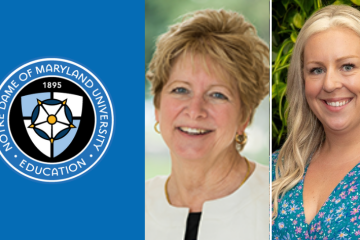#NDMUExpert: Preventing Teacher Burnout with Self-care

(BALTIMORE, Md.) – Now that many schools are back in session for the fall, educators and students are having to adjust to new ways of teaching and learning in the classroom. With all of the changes surrounding a return to the classroom with the presence of COVID-19 in our lives, teachers are playing a larger role in keeping students safe in the learning environment, while making sure they receive a quality education.
Teacher burnout is a widespread problem affecting our nation’s schools. Nearly one in four teachers said they were likely to leave their jobs by the end of the 2020–21 school year, compared to one in six teachers who were likely to leave before the pandemic, according to the 2021 State of the U.S. Teacher Survey. The report also found that a much higher proportion of teachers experience frequent job-related stress and symptoms of depression than the general adult population.
Dr. Kristine Larson aims to help educators to flourish during these especially difficult times. She is chair of Teacher Education for Flourishing Collaborative at Notre Dame of Maryland University. In partnership with the Human Flourishing Program at Harvard and the Consortium for Human Flourishing at Saint Louis University, the collaborative brings together researchers, administrators, practitioners, and thought leaders to promote flourishing and a focus on personal well-being in teacher education. Dr. Larson shares what educators can do to avoid burnout and find success in the classroom:
What can educators do to flourish, especially during this uncertain time?
One of the most important things that I do is have a routine. My routine is not going to look like your routine. We create time for the things that we think are important. I hope that this idea of self-care is important enough that educators will create time for it. It’s about making a commitment to that routine. What can you do a little each day that you can sustain over a long period of time?
If you’re not taking care of yourself, you’re not preparing yourself for teaching and learning.
What does your self-care routine look like?
I call my morning routine my 4-20 – I do four things for 20 minutes each. First, I always make sure to read something uplifting every morning. It’s generally something of a spiritual nature – something connected to meaning and purpose, character and virtue. Then, the next thing I do is meditate. I either have a passage that I meditate on, or I have a positive word that I bring to mind. Next, I'll do yoga or some type of physical activity. Finally, I shower and get ready for the day. All of those things are what I do in the morning.
What other practices help maintain your well-being?
Throughout the day, I try to drink a lot of water. I think we underestimate the importance of water. I started to recognize how chronically dehydrated I was. My joints feel better, my skin feels better, and I feel better in general when I drink enough water. I feel much calmer and centered. It's important to feel like you’re nourishing your soul in some way with your food and what you’re drinking.
What inspires you to help other educators to flourish and thrive?
At some point in my own career, I was definitely not flourishing. I can look back and see that some of the behaviors I exhibited were a result of my stress. I don’t ever want to be that teacher again. I wanted to flourish, but I didn’t know how. I wish that I had had a little guidance around that. Today, I do feel like I’m a happier person and flourishing, so I want to be able to pass that on to people.
When I look at flourishing, I really want to mitigate teacher attrition because that is a huge problem in education. In the end, teacher attrition impacts our students. When you have a school where there is a revolving door of teachers, that instability does not feel good for anybody. So, that’s where my passion comes from.
Established in 1895, Notre Dame of Maryland University (NDMU) is a private, Catholic institution in Baltimore, Maryland, with the mission to educate leaders to transform the world. Notre Dame has been named one of the best "Regional Universities North" by U.S. News & World Report.




